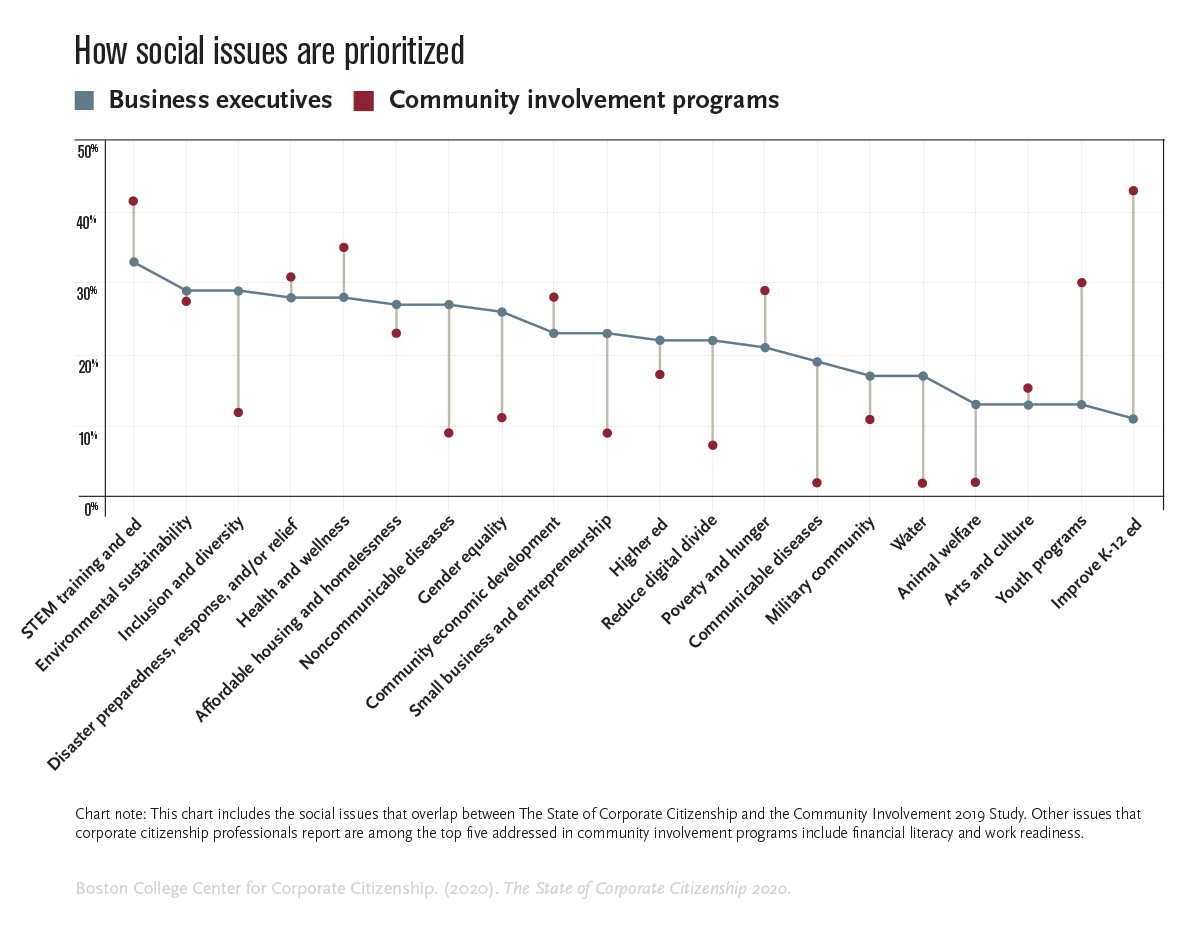Check out the latest findings and best practices from BCCCC's Community Involvement Board, comprised of corporate leaders working in corporate giving, community relations, and related roles.
Get in sync with executives on corporate citizenship

To deliver strategic global impact on behalf of their companies, corporate citizenship professionals must demonstrate a special kind of leadership that mobilizes many stakeholders—from employees and customers to suppliers and the communities in which their firms operate. This means that using the power of networks and influence, even if we lack authority, is a crucial part of the CSR leader’s toolkit.
This approach is critical when working with the C-suite. New findings from our survey of more than 750 executives suggest that corporate citizenship professionals and their leaders and peers could be communicating better about corporate citizenship priorities and commitments. According to the State of Corporate Citizenship 2020, sponsored by UPS, executives prioritize investments differently than community involvement programs are. For example, nearly 30% of executive respondents ranked inclusion and diversity as a top social issue that their companies should address, but only 12% of community involvement programs address this issue specifically.
Where there is a divergence between the level of executive priority and community involvement investment, there is an opportunity for corporate citizenship professionals to engage the C-suite in conversations about the issues their companies are best positioned to address. Consistent with previous studies, the data from this year’s State of Corporate Citizenship study suggest that executives do understand that well-designed and effectively executed corporate citizenship both helps to accomplish business results and create social value. So where’s the disconnect? The answer lies in how executives define well-designed and effectively executed corporate citizenship versus how the community involvement department may do so.
Before the conversation with an executive, set up your programs for business alignment:
- Understand your business strategy and be prepared to talk about how a variety of corporate citizenship programs can support these objectives. Don’t be wedded to one idea or a project that you have been doing for a long time. Come in with an open mind and some blue ocean thinking.
- Be prepared to do a lot of listening. Does your HR department need some opportunities for leadership development? Your Public Affairs team needs some help with specific communities of operation? How about a skills-based volunteer initiative or a board placement program? Listen closely to see where you can plug in your work to address the issues of other business units.
- Encourage corporate citizenship leadership from every seat. Part of the role of the corporate citizenship professional is to be a connector. If you are reporting only what happens in the corporate citizenship department, you are leaving 99% of the potential value of your program on the table.
Once you’ve got the attention of your colleagues, three actions can differentiate your ability to deliver results.
- Be strategic about selection: Pick the issue that you are capable of addressing uniquely as a company in your industry and operating context.
- Integrate corporate citizenship into key business goals: Ensure you understand your business strategy, as well as the social and environmental issues that present the greatest opportunities or challenges to your ability to execute it.
- Invest for duration: If you are able to achieve the above, executives will more likely view corporate citizenship as adding value over time, saving your time and necessity to justify resources.
Corporate citizenship professionals can use these insights to align their efforts with executive perspectives about where corporate citizenship adds value to both society and to business operations. By selecting the right issues, ensuring activities are integrated with business strategy, and committing to an adequate duration of investment, corporate citizenship professionals create value—both for their companies and for us all.
Related Content
Check out the latest findings and best practices from BCCCC's ESG Reporting Board, comprised of corporate leaders working in sustainability reporting.
Check out the latest findings and best practices from BCCCC's Sustainability in Manufacturing & Retail Board, comprised of corporate leaders whose roles address emerging regulation, changes in consumer preferences, and the need to manage ESG risks and opportunities throughout value chains.
Check out the latest findings and best practices from BCCCC's Professional Services Sustainability Board
Check out the latest findings and best practices from BCCCC's Opportunity, Inclusion & Workforce Engagement Board, comprised of corporate leaders working in inclusion, belonging, and employee engagement roles.
Check out the latest findings and best practices from BCCCC's Health Equity Board, comprised of corporate leaders from a variety of industries, all exploring social determinants of health and efforts to support more equitable health outcomes.
This month’s Member Meetup highlighted how CSR teams work alongside government relations colleagues.
In today's complex business environment, many corporate citizenship leaders are working strategically with their employee resource groups (ERGs). Also known as business network groups or affinity groups, these employee-led communities can foster a sense of inclusion and belonging, while sponsoring events and learning opportunities for people all throughout an organization.



